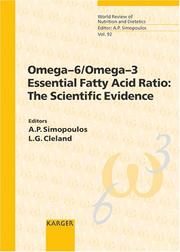| Listing 1 - 5 of 5 |
Sort by
|
Dissertation

Year: 2019 Publisher: Liège Université de Liège (ULiège)
Abstract | Keywords | Export | Availability | Bookmark
 Loading...
Loading...Choose an application
- Reference Manager
- EndNote
- RefWorks (Direct export to RefWorks)
Les acides gras polyinsaturés à longue chaîne peuvent être divisés en deux groupes : les oméga-3 et les oméga-6. Tous les deux sont des acides gras dits « essentiels » car l’organisme n’est pas capable de les synthétiser, ils doivent donc être apportés par le régime alimentaire. Parmi les acides gras oméga-3 importants, on peut citer l’acide alpha-linolénique (ALA), l'acide docosahexaénoïque (DHA) et l'acide eicosapentaénoïque (EPA). Concernant les acides gras oméga-6, j’aborderai l’acide linoléique (LA) et l’acide arachidonique (AA). Les sources alimentaires en acides gras de type oméga-3 sont à la fois animales et végétales. Certains types de poisson (saumon, thon, maquereau, sardine) sont très riches en EPA et DHA contrairement à l’ALA qu’on retrouvera plutôt dans les végétaux. La balance oméga6/oméga-3 est déséquilibrée dans le régime occidental car la nourriture est souvent trop riche en acides oméga-6 et pauvre en acides oméga-3. Les principales sources en acides gras oméga-6 sont le maïs, les huiles de carthame et de tournesol. Ce déséquilibre entre oméga6/oméga-3 aurait un impact négatif sur la santé. Outre l’importance de ce ratio, les quantités sont également importantes à considérer. De nombreuses recherches semblent montrer qu’un apport suffisant en EPA et DHA dans le régime alimentaire permet de prévenir des problèmes, tels que les maladies cardiovasculaires, métaboliques, le cancer et les problèmes inflammatoires. A contrario, il apparaît qu’un excès d’acides gras oméga-6 joue un rôle défavorable.
Book
ISBN: 2930151234 9782930151236 Year: 2008 Volume: 12 Publisher: Brussel Instituut Danone
Abstract | Keywords | Export | Availability | Bookmark
 Loading...
Loading...Choose an application
- Reference Manager
- EndNote
- RefWorks (Direct export to RefWorks)
Acides gras oméga-3 --- Omega-3 fatty acids --- Omega-3 vetzuren --- Oméga-3 acides gras --- Voeding en gezondheid --- vetzuren --- 613.21 --- Physiological effect
Book
ISBN: 286883728X 9782868837288 Year: 2004 Publisher: Les Ulis : EDP Sciences,
Abstract | Keywords | Export | Availability | Bookmark
 Loading...
Loading...Choose an application
- Reference Manager
- EndNote
- RefWorks (Direct export to RefWorks)
Les travaux scientifiques et cliniques ont démontré combien notre alimentation moderne est mal adaptée à la préservation de notre capital-santé : nous mangeons trop d'acides gras de type oméga-6 et insuffisamment d'acides gras oméga-3. Le Régime Oméga 3, simple et révolutionnaire à la fois, est un plan d'action qui commence en faisant son marché et se poursuit lors de nos différents repas. Le Régime Oméga 3 n'a rien à voir avec un régime austère au sens français souvent retenu, généralement administré quand les pathologies apparaissent : les auteurs nous proposent de véritablement sauver notre santé en mangeant bien et agréablement, en mangeant mieux. Cet ouvrage est une adaptation pour le public français du best-seller The Oméga Diet. Pour tout lecteur désirant s'approprier son alimentation pour être en bonne santé.
Omega-3 --- Vetzuren --- Diëten --- Fatty acids, omega-3 --- Fatty Acids, Omega-3. --- Diet, Mediterranean. --- Dietary Fats. --- Diet Therapy. --- Acides gras dans l'alimentation humaine. --- Acides gras oméga-3 --- Régimes pauvres en lipides --- Régimes alimentaires. --- Emploi en thérapeutique. --- Recettes.

ISBN: 3805576404 3318010189 Year: 2003 Volume: v. 92 Publisher: Basel : Karger,
Abstract | Keywords | Export | Availability | Bookmark
 Loading...
Loading...Choose an application
- Reference Manager
- EndNote
- RefWorks (Direct export to RefWorks)
Omega-6/omega-3 fatty acid ratio. --- Essential fatty acids in human nutrition --- Acides gras oméga 6/Acides gras oméga 3 --- Acides gras essentiels dans l'alimentation humaine --- Fatty Acids, Essential --- Fatty Acids, Omega-3 --- Linoleic Acids --- metabolism. --- Acide gras --- Fatty acids --- Physiologie de la nutrition --- Nutrition physiology --- Métabolisme des lipides --- Lipid metabolism --- Trouble du métabolisme --- Metabolic disorders --- Maladie de l'homme --- Human diseases --- Maladie immunologique --- Immunological diseases --- Immunité --- immunity --- Aliment de régime --- Dietetic foods --- Acides gras oméga 6/Acides gras oméga 3

ISBN: 1282360396 9786612360398 0520941322 1601293941 9780520941328 1429402326 9781429402323 9781282360396 0520242823 9780520242821 9781601293947 9780520242821 0520242823 9780520253803 Year: 2006 Publisher: Berkeley University of California Press
Abstract | Keywords | Export | Availability | Bookmark
 Loading...
Loading...Choose an application
- Reference Manager
- EndNote
- RefWorks (Direct export to RefWorks)
A nutritional whodunit that takes readers from Greenland to Africa to Israel, The Queen of Fats gives a fascinating account of how we have become deficient in a nutrient that is essential for good health: the fatty acids known as omega-3s. Writing with intelligence and passion, Susan Allport tells the story of these vital fats, which are abundant in greens and fish, among other foods. She describes how scientists came to understand the role of omega-3s in our diet, why commercial processing has removed them from the food we eat, and what the tremendous consequences have been for our health. In many Western countries, epidemics of inflammatory diseases and metabolic disorders have been traced to omega-3 deficiencies. The Queen of Fats provides information for every consumer who wants to reduce the risk of heart disease, cancer, arthritis, and obesity and to improve brain function and overall health. This important and compelling investigation into the discovery, science, and politics of omega-3s will transform our thinking about what we should be eating.* Includes steps you can take to add omega-3s to your diet* Shows why eating fish is not the only way, or even the best way, to increase omega-3s.* Provides a new way to understand the complex advice about the role and importance of fats in the body* Explains how and why the food industry has created a deadly imbalance of fats in our foods* Shows how omega-3s can be reintroduced to our diet through food enrichment and changes in the feeding of livestock
Omega-3 fatty acids --- Essential fatty acids in human nutrition. --- N-3 fatty acids --- Omega-3 EFA --- Omega-3 essential fatty acids --- Unsaturated fatty acids --- High-omega-3 fatty acid diet --- Vitamin F in human nutrition --- Nutrition --- Research --- History. --- Health aspects. --- Acides gras oméga-3. --- africa. --- america. --- arthritis. --- brain function. --- california. --- cancer. --- commercial food processing. --- diet and nutrition. --- eating fats. --- fats. --- fatty acids. --- food and culture. --- food industry. --- food nutrition. --- food science. --- greenland. --- health and wellness. --- health nuts. --- health. --- healthy fats. --- heart disease. --- inflammatory diseases. --- israel. --- metabolic disorders. --- metabolism. --- nonfiction. --- nutrients. --- obesity. --- omega 3 fats. --- omega 3s. --- popular science. --- vital nutrients. --- western diets. --- western nutrition. --- Acides gras oméga-3.
| Listing 1 - 5 of 5 |
Sort by
|

 Search
Search Feedback
Feedback About UniCat
About UniCat  Help
Help News
News